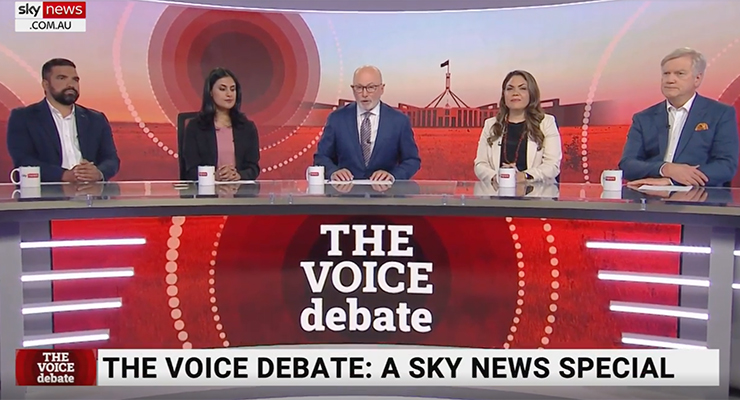
Australians will be expected to vote on a proposal to recognise an Aboriginal and Torres Strait Islander Voice to Parliament, so any opportunity to learn about what various sides think ought to be good — even if discussion might turn up in surprising places.
A case in point is the hour-long debate on Sky News on Sunday night. The debate was hosted by Chris Kenny, a supporter of the Voice, and was broken up with video packages to give viewers background. The sparring between participants was informed and at times animated.
It should be noted at the outset that Kenny was involved in the co-design process under the previous Liberal government, and he declared upfront that he supported the Voice before the preliminary statements from participants.
Who was on it?
Taking the cudgels up in favour of the Voice were Dr Shireen Morris, a constitutional lawyer, and Dean Parkin, a director with the From The Heart campaign and from the Quandamooka peoples of Minjerribah. Warlpiri/Celtic Senator Jacinta Price and Sky News host Andrew Bolt took to the crease for the negative.
Each participant gave as good as they got, so we can expect this passion on both sides to increase as the country gets closer to the decision.
Minister for Indigenous Australians and Wiradjuri woman Linda Burney. and Assistant Minister and Yanyuwa woman Senator Malarndirri McCarthy. declined to appear.
The debate was a degustation menu of sorts, providing a sampling of what we can expect.
The absence of firm detail was a familiar thread throughout the hour. A package showed Kenny displaying the final report of the co-design consultation process released last year. That report is apparently not enough for opponents of the Voice and won’t be until they see a firm proposal. Public debate will then revert to the inevitable focus on whether it is discriminatory or simply ensuring that people about whom laws can be made specifically actually get consulted about it.
Bolt’s view on the Voice creating a segregated nation has been aired more times than some people have had hot breakfasts, but he was nowhere near as animated or feisty during this hour as he was during a tussle worth watching with Kenny on his own Sky News program.
Issues of discrimination and special treatment were highlighted by Price, and she also raised a concern about how the Voice might impact her work as a First Nations senator. Will she have to go to the Voice every single time she wants to put up a private member’s bill on something that impacts First Nations communities?
Morris noted that First Nations politicians are not merely there to represent Aboriginal and Torres Strait Islanders and that their job is to represent the broader electorate as well as consider party-related priorities. She also said there were prominent figures in First Nations communities, such as Noel Pearson, who were capable of picking up a phone and consulting with governments directly. A Voice to Parliament would give other people a chance to have a say.
Parkin took the time to explain the Uluru Statement From the Heart consultation process so it was clear how the idea and its purpose came about.
The ghosts of consultative ventures in the past, such as the Aboriginal and Torres Strait Islander Commission, will haunt the present debate and will be used by advocates against constitutional recognition as a reason to vote against the proposal.
Australia, you are in for a very bumpy ride.
What are your thoughts on an Indigenous Voice to Parliament? Let us know by writing to letters@crikey.com.au. Please include your full name to be considered for publication. We reserve the right to edit for length and clarity.








It’s amusing that beyond Price, the only other “opposition” voice they could find was Andrew Bolt who’s expertise is what, being a racist journalist?
Bolt should have his articles changed to “the Negative Nancy Viewpoint”
He seems totally incapable of writing anything positive, and rails against so many things that he claims are “divisive”, when in fact his articles are divisive.
Self-acclaimed whisky connoisseur. He is an incredibly important person, a one-man refutation of the notion of white supremacy.
Journalist?
Australia’s take on the Voice of London.
If Price is against it there must be some good to it. I will look again.
There seems to be ill will and darkness on all sides for something not yet created and sold. We all wait…
What exactly will Australians of all shades be voting for in a Referendum? From what I can divine from rather scant and even less illuminating double speak so far on the subject we will be voting in advance to let Parliament, other interested bodies et al frame and pass into law something different to that which applies now and which remains undefined to date?
From painful recollection the last time I heard that a dear friend had a very good deal for the Australian Government was when we allowed the Americans to sell us a rust bucket of a naval support ship at a give-away price. Oh, wait – I forgot all about the Lockheed Martin F-35 Lightning II of more recent ignominy.
I, for one, will want to know exactly what the proposed outcome is to be – for a start – if I am to vote. Any omission on that ground alone will degenerate into a vote for the lowest common political denominator, a plunge for the bottom of political expediency which always trumps notions of equality under law and in political treatment..